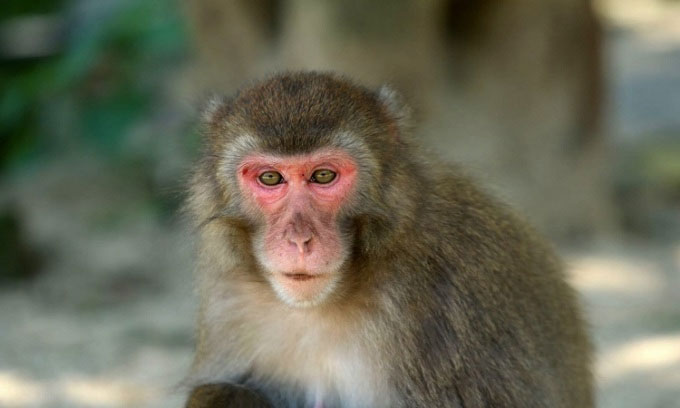A 9-year-old snow monkey in southern Japan dethroned the dominant male last year to become the first female leader of her troop in the 70-year history of the sanctuary.
Yakei, the female snow monkey, leads a troop of 677 monkeys at the Takasakiyama Natural Zoo, a monkey sanctuary established in 1952. There are two monkey troops in the sanctuary on the island, which spend most of their time wandering around the mountain in the center of the island. They also visit the park at the foot of the mountain daily for feeding by staff.

Yakei the female snow monkey at Takasakiyama sanctuary. (Photo: Takasakiyama Natural Zoo)
Yakei’s ambition for the leadership position surprised both scientists and conservation staff. They are closely monitoring to see how long she can maintain her supreme position. With the breeding season approaching, Yakei is entering the love triangle, and some experts are concerned she could easily be dethroned.
Snow monkeys, also known as Japanese macaques (Macaca fuscata), are native animals with high intelligence in Japan. They are famous for their reddish-pink buttocks and their love for soaking in hot springs. While many animals, including bees, hyenas, and elephants, live in matriarchal societies, the behavior of female snow monkeys usurping power is rare in snow monkey society, with only a few cases documented in primatology history, according to Yu Kaigaishi, a researcher at the Japan Society for the Promotion of Science.
Snow monkey society has a strict hierarchy. The higher an individual’s rank, the greater their access to food, mates, and resting places. Female monkeys inherit their rank immediately after their mothers and rarely leave the troop they are born into. Male monkeys leave the troop upon maturity and join new ones, where their rank is often determined by their length of stay. However, snow monkeys can sometimes ascend to higher ranks through aggression, especially among males.
Yakei has changed primatologists’ perceptions of snow monkeys. Last April, she defeated her own mother to claim the top position among the female monkeys in the troop. While most females were content with their rank, Yakei continued to fight. According to conservation staff, Yakei attacked three high-ranking males before confronting Nanchu, the male who led the entire troop for five years. At 31 years old, Nanchu is quite old and not a match for the young and determined Yakei.
After Yakei dethroned Nanchu, conservation staff conducted a “chestnut test”: “They scattered chestnuts for the monkeys to see which one would grab them first. Both male and female monkeys stepped aside to let Yakei eat first, confirming her leadership position. Since then, Yakei has displayed behaviors typically seen in dominant males, such as moving with her tail raised and shaking branches. She behaves like a mature male monkey, becoming more aggressive towards other monkeys,” Kaigaishi noted.
Despite Yakei seemingly securing her new position, she undoubtedly faces many challenges. The dominance period of a male leader can last from a few months to over a decade. However, observations of the troop indicate that the breeding season can change everything for Yakei. The breeding season at the sanctuary typically lasts from November to March. During this time, male and female monkeys bond in pairs. They mate, forage, rest, and move together with their partners for an average of 16 days. After this period, the bond ends, and females seek new partners. Females typically mate with an average of four males each breeding season.
“The breeding season often heats things up in snow monkey society,” said researcher Katherine Cronin at Lincoln Park Zoo in Chicago, an expert on animal social behavior and cognition. “The environment becomes more competitive and stressful.”
During the previous breeding season, Yakei paired with Goro, a 15-year-old male ranked sixth in the troop. According to the sanctuary, Goro bit Yakei on the face in 2019. This behavior caused Yakei’s buttocks to turn bright red, a sign that she was ready to consider Goro as a mate. However, since Yakei took the leadership position, Goro seems to have lost interest in her.
Subsequently, another male named Luffy, 18 years old and ranked fifth in the troop, attempted to woo Yakei but has not been successful. Luffy likes Yakei, but it appears to be one-sided, said Satoshi Kimoto, a guide at Takasakiyama. Yakei could potentially mate with both Goro and Luffy this breeding season. However, her recent apparent dislike for Luffy seems to have developed into more of a fearful attitude.
“I visited Takasakiyama last week and observed Yakei displaying facial expressions typically seen in lower-ranking individuals towards Luffy,” Kaigaishi shared. “Additionally, I also caught Luffy pushing Yakei to monopolize food.” While Kaigaishi believes more data is needed before drawing conclusions, he noted that it seems Luffy is gaining the upper hand over Yakei.
Experts are unsure whether Yakei’s behavior is a result of losing dominance or a sign that she does not wish to mate with Luffy. Kimoto remains confident that Yakei is maintaining her leadership position and will not lose it just because of mating. If Yakei continues to dominate, scientists like Kaigaishi will have a unique opportunity to study how the snow monkey troop survives under the leadership of a female.


















































